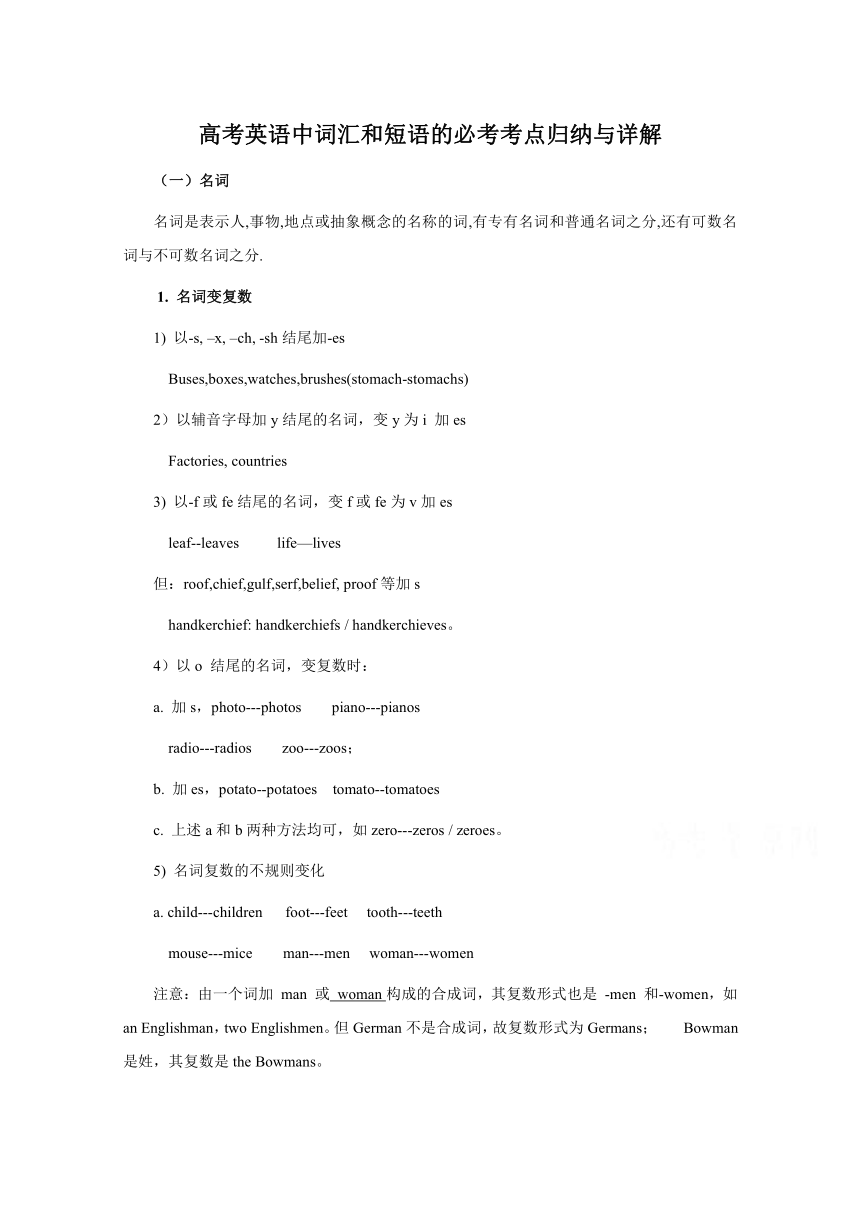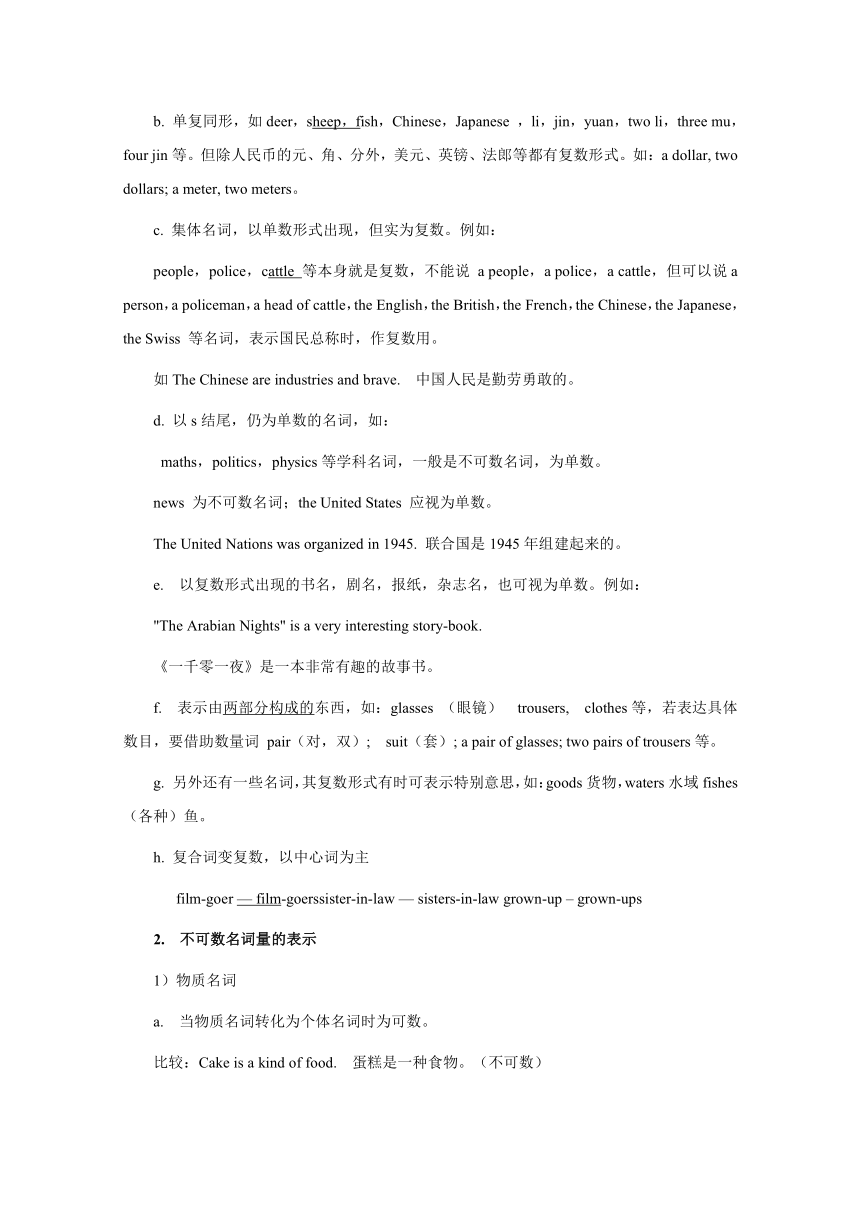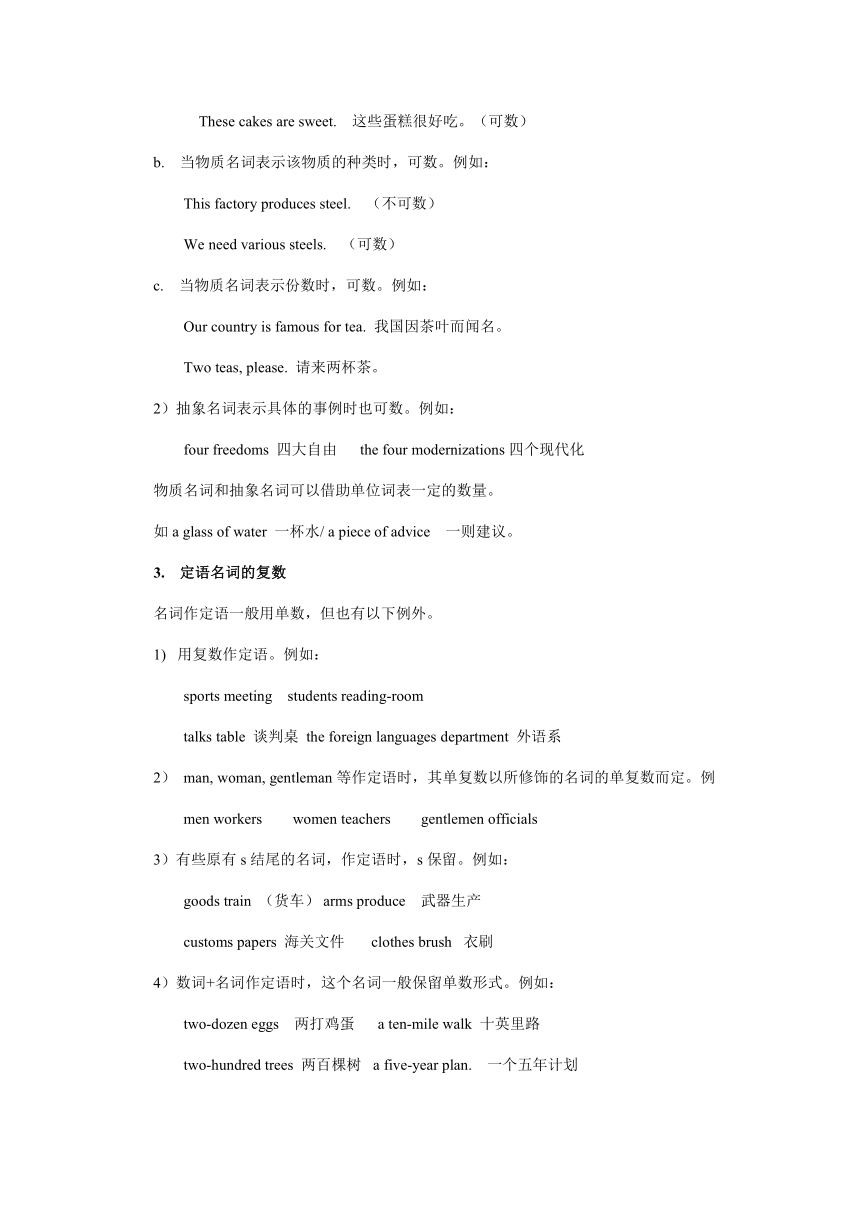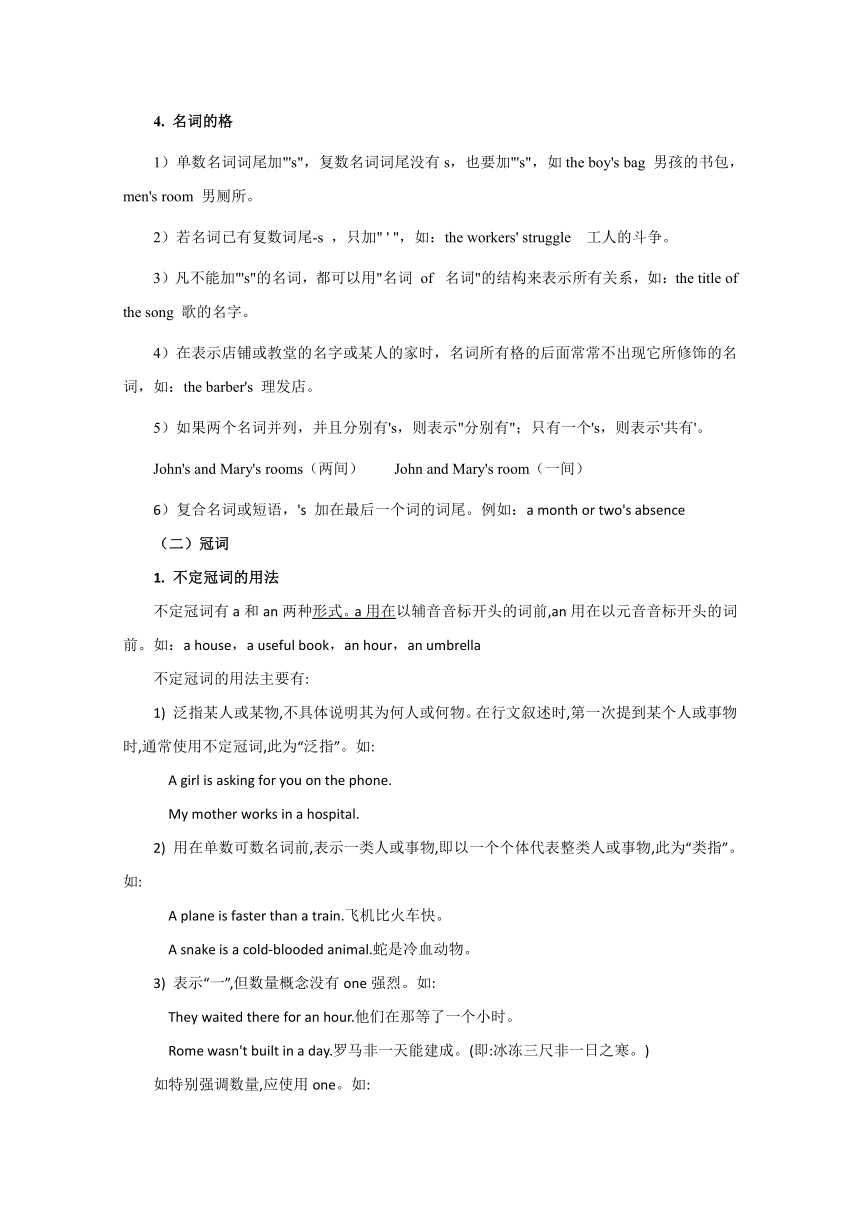2017最新高三总复习(专题攻略)之词汇、短语与句型:高考英语中词汇和短语的必考考点归纳与详解
文档属性
| 名称 | 2017最新高三总复习(专题攻略)之词汇、短语与句型:高考英语中词汇和短语的必考考点归纳与详解 |  | |
| 格式 | zip | ||
| 文件大小 | 26.7KB | ||
| 资源类型 | 教案 | ||
| 版本资源 | 通用版 | ||
| 科目 | 英语 | ||
| 更新时间 | 2016-11-28 22:00:02 | ||
图片预览




文档简介
高考英语中词汇和短语的必考考点归纳与详解
(一)名词
名词是表示人,事物,地点或抽象概念的名称的词,有专有名词和普通名词之分,还有可数名词与不可数名词之分.
1.
名词变复数
1)
以-s,
–x,
–ch,
-sh结尾加-es
Buses,boxes,watches,brushes(stomach-stomachs)
2)以辅音字母加y结尾的名词,变y为i
加es
Factories,
countries
3)
以-f或fe结尾的名词,变f或fe为v加es
leaf--leaves
life—lives
但:roof,chief,gulf,serf,belief,
proof等加s
handkerchief:
handkerchiefs
/
handkerchieves。
4)以o
结尾的名词,变复数时:
a.
加s,photo---photos piano---pianos
radio---radios zoo---zoos;
b.
加es,potato--potatoes tomato--tomatoes
c.
上述a和b两种方法均可,如zero---zeros
/
zeroes。
5)
名词复数的不规则变化
a.
child---children
foot---feet tooth---teeth
mouse---mice man---men woman---women
注意:由一个词加
man
或
woman
( http: / / www.21cnjy.com )构成的合成词,其复数形式也是
-men
和-women,如an
Englishman,two
Englishmen。但German不是合成词,故复数形式为Germans;
Bowman是姓,其复数是the
Bowmans。
b.
单复同形,如deer,sheep,f
( http: / / www.21cnjy.com )ish,Chinese,Japanese
,li,jin,yuan,two
li,three
mu,four
jin等。但除人民币的元、角、分外,美元、英镑、法郎等都有复数形式。如:a
dollar,
two
dollars;
a
meter,
two
meters。
c.
集体名词,以单数形式出现,但实为复数。例如:
people,police,cattle
( http: / / www.21cnjy.com )等本身就是复数,不能说
a
people,a
police,a
cattle,但可以说a
person,a
policeman,a
head
of
cattle,the
English,the
British,the
French,the
Chinese,the
Japanese,the
Swiss
等名词,表示国民总称时,作复数用。
如The
Chinese
are
industries
and
brave. 中国人民是勤劳勇敢的。
d.
以s结尾,仍为单数的名词,如:
maths,politics,physics等学科名词,一般是不可数名词,为单数。
news
为不可数名词;the
United
States
应视为单数。
The
United
Nations
was
organized
in
1945.
联合国是1945年组建起来的。
e.
以复数形式出现的书名,剧名,报纸,杂志名,也可视为单数。例如:
"The
Arabian
Nights"
is
a
very
interesting
story-book.
《一千零一夜》是一本非常有趣的故事书。
f.
表示由两部分构成的
( http: / / www.21cnjy.com )东西,如:glasses
(眼镜) trousers, clothes等,若表达具体数目,要借助数量词
pair(对,双); suit(套);
a
pair
of
glasses;
two
pairs
of
trousers等。
g.
另外还有一些名词,其复数形式有时可表示特别意思,如:goods货物,waters水域fishes(各种)鱼。
h.
复合词变复数,以中心词为主
film-goer
—
film
( http: / / www.21cnjy.com )-goerssister-in-law
—
sisters-in-law
grown-up
–
grown-ups
2.
不可数名词量的表示
1)物质名词
a.
当物质名词转化为个体名词时为可数。
比较:Cake
is
a
kind
of
food. 蛋糕是一种食物。(不可数)
These
cakes
are
sweet. 这些蛋糕很好吃。(可数)
b.
当物质名词表示该物质的种类时,可数。例如:
This
factory
produces
steel. (不可数)
We
need
various
steels. (可数)
c.
当物质名词表示份数时,可数。例如:
Our
country
is
famous
for
tea.
我国因茶叶而闻名。
Two
teas,
please.
请来两杯茶。
2)抽象名词表示具体的事例时也可数。例如:
four
freedoms
四大自由
the
four
modernizations四个现代化
物质名词和抽象名词可以借助单位词表一定的数量。
如a
glass
of
water
一杯水/
a
piece
of
advice 一则建议。
3.
定语名词的复数
名词作定语一般用单数,但也有以下例外。
1)
用复数作定语。例如:
sports
meeting
students
reading-room
talks
table
谈判桌 the
foreign
languages
department
外语系
2)
man,
woman,
gentleman等作定语时,其单复数以所修饰的名词的单复数而定。例
men
workers women
teachers gentlemen
officials
3)有些原有s结尾的名词,作定语时,s保留。例如:
goods
train
(货车) arms
produce 武器生产
customs
papers
海关文件
clothes
brush
衣刷
4)数词+名词作定语时,这个名词一般保留单数形式。例如:
two-dozen
eggs 两打鸡蛋
a
ten-mile
walk
十英里路
two-hundred
trees
两百棵树
a
five-year
plan. 一个五年计划
4.
名词的格
1)单数名词词尾加"'s",复数名词词尾没有s,也要加"'s",如the
boy's
bag
男孩的书包,men's
room
男厕所。
2)若名词已有复数词尾-s
,只加"
'
",如:the
workers'
struggle 工人的斗争。
3)凡不能加"'s"的名词,都可以用"名词
of
名词"的结构来表示所有关系,如:the
title
of
the
song
歌的名字。
4)在表示店铺或教堂的名字或某人的家时,名词所有格的后面常常不出现它所修饰的名词,如:the
barber's
理发店。
5)如果两个名词并列,并且分别有's,则表示"分别有";只有一个's,则表示'共有'。
John's
and
Mary's
rooms(两间) John
and
Mary's
room(一间)
6)复合名词或短语,'s
加在最后一个词的词尾。例如:a
month
or
two's
absence
(二)冠词
1.
不定冠词的用法
不定冠词有a和an两种形式。a用在
( http: / / www.21cnjy.com )以辅音音标开头的词前,an用在以元音音标开头的词前。如:a
house,a
useful
book,an
hour,an
umbrella
不定冠词的用法主要有:
1)
泛指某人或某物,不具体说明其为何人或何物。在行文叙述时,第一次提到某个人或事物时,通常使用不定冠词,此为“泛指”。如:
A
girl
is
asking
for
you
on
the
phone.
My
mother
works
in
a
hospital.
2)
用在单数可数名词前,表示一类人或事物,即以一个个体代表整类人或事物,此为“类指”。如:
A
plane
is
faster
than
a
train.飞机比火车快。
A
snake
is
a
cold-blooded
animal.蛇是冷血动物。
3)
表示“一”,但数量概念没有one强烈。如:
They
waited
there
for
an
hour.他们在那等了一个小时。
Rome
wasn't
built
in
a
day.罗马非一天能建成。(即:冰冻三尺非一日之寒。)
如特别强调数量,应使用one。如:
I
have
only
one
dictionary
and
I
need
it
myself.
4)
用在表示时间、速度、价格等计量单位的名词前表示“每一”,相当于per或every。如:
The
plane
can
get
300
kilometers
an
hour.飞机的速度是每小时300公里。
The
doctor
told
h
( http: / / www.21cnjy.com )er
to
take
the
medicine
three
times
a
day.医生叫她一天服三次药。
5)
用于抽象名词、物质名词前(特别是这两种名词有定语修饰时),使之意义具体化,表示“一种”、“一件”、“一份”等。如:
It
is
an
honour
for
me
to
be
invited
to
the
party.
我被邀请参加聚会是一种荣誉。(honour是抽象名词,an
honour指一件荣誉的事)
There
was
heavy
rain
last
week.(rain为物质名词,这里指一场雨)
6)
用于序数词(后加名词)前,表示又一个,又一次。如:
He
tried
a
sixth
time
and
succeeded.他又试第六次,结果成功了。
When
I
sat
down,a
fourth
student
rose
to
speak.当我坐下时,又有第四个同学起立发言。
7)
用于某一个人名、地名前,使专有名词普通化。如:
A
Mr.Li
has
been
waiting
for
you.一位姓李的先生一直在等你。
Chongqing
is
known
as
a
Shanghai
of
the
west.重庆被称作西部的上海。
(Shanghai是专有名词,本句中a
Shanghai指和上海一样繁华的城市)
8)
用于某些固定词组中,是这些词组不可缺少的组成部分。如:
in
a
moment立刻,马上once
upon
a
time从前
as
a
result
(of)作为(……)的结果
in
a
hurry急忙地
in
a
word一句话,总而言之once
in
a
while偶尔地
have
a
good
time过得很愉快have
a
word
with与……说句话
have/take
a
look
(at)看一看
have/take
a
rest休息一下
take
an
active
part
in积极参加
(比较:take
part
in参加,不能说take
a
part
in)
do
sb.a
favour帮某人的忙
put
an
end
to结束
at
a
mouthful一大口地all
of
a
sudden突然地
2.
定冠词the的用法
① 表示上文提到过
( http: / / www.21cnjy.com )的人或事物。
He
bought
an
English-Chinese
dictionary
this
morning.
The
dictionary
is
very
good
( http: / / www.21cnjy.com ).
② 用于单数可数名词前,表示整体或类别。
The
panda
is
a
rare
animal.
此句等于:A
panda
is
a
rare
animal.
=
Pandas
are
rare
animals.
③ 用来表示世界上独一无二的事物。
the
sun,
the
moon,
the
sky,
the
earth,
the
world
④ 用于表示阶级、党派的名词前。
the
Chinese
Communist
Party,
the
working
class
the
proletariat
无产阶级
⑤ 常用于含有普通名词或形容词的专有名词前。
a.
用于许多江海,山脉,群岛等名词前:
The
Yellow
River
The
East
Sea
the
Himalayas
the
Pacific
Ocean
b.
用于由普通名词构成的国名:
The
People’s
Republic
of
China
the
United
States
c.
用于机关、团体、朝代、时代、报刊杂志等名词前:
the
United
Nations
the
State
Council
the
Tang
dynasty
the
People’s
Daily
⑥ 用于表示方位的名词前。
the
east
the
southwest
the
middle
the
Far
East
on
the
left
⑦ 用于乐器名词前,但汉语拼音的乐器前不用冠词。
play
the
piano
play
the
violin
play
erhu
⑧ 用于复数的姓氏前,表示两夫妇或全家,在此情况下,这类名词作复数对待。
The
Smiths
watch
TV
every
day.
⑨ 用于某些形容词或过去分词前,表示一类人或事物。
the
poor
the
rich
the
living
the
young
⑩ 用在形容词的最高级前或序数词前。
Shanghai
is
the
biggest
city
in
china.
After
the
game,
the
first
thing
they
wanted
to
do
was
to
take
a
hot
bath.
3.
零冠词用法
① 表
( http: / / www.21cnjy.com )示某一类人或事物的复数名词前,不用冠词。
Now
people
are
living
a
happy
life.
Trees
are
planted
everywhere.
② 不含普通名词的专有名词,表示泛指的物质名词和抽象名词前,不用冠词。
We
are
studying
English.
He
is
leaving
for
America
this
year.
It
is
pleasant
to
walk
in
soft
snow.
Love
is
always
stronger
than
hatred.
③ 名词前有指示代词、物主代词、不定代
( http: / / www.21cnjy.com )词或名词所有格修饰,不用冠词。
I
like
this
picture
better.
Is
that
your
book
Take
their
chairs
away!
I
do
not
have
any
money
on
me.
As
time
went
on,
Einstein’s
theory
proved
to
be
correct.
④ 季节、月份、星期等名词前,一般不用冠词。
She
likes
spring
while
I
like
summer.
We
have
no
classes
on
Saturday.
The
Long
March
started
in
October
1934.
⑤ 表示只有一人担任的职务、头衔的名词前,不用冠词。
We
have
elected
him
our
monitor.
⑥ 三餐饭的名词前,一般不用冠词。
When
do
you
have
lunch
After
supper
we
usually
take
a
walk.
⑦ 节假日等名词前,不用冠词。
Children
all
wear
their
best
clothes
on
National
Day.
People
give
gifts
to
each
other
on
Christmas
Day.
注意:在eve后有of短语则要加定冠词:
on
the
eve
of
National
Day
on
the
eve
of
New
Year’s
Day
⑧ 球类和棋类运动的名词前,不用冠词。
play
basketball
play
chess
⑨ 作表语用表示程度的形容词最高级前,不用冠词。
Your
help
was
most
timely.
This
method
is
most
effective.
注意:如果有比较范围,形容词最高级前必须加定冠词:
Of
all
methods,
this
is
the
most
effective.
⑩ 在某些固定词组里,名词前不用冠词。
on
foot by
train/
boat
/
plane… in
fact as
a
matter
of
fact
in
class in
church
in
danger in
hospit
( http: / / www.21cnjy.com )al in
town
in
bed at
home at
school at
daybreak at
sunrise
at
dusk at
sunset
( http: / / www.21cnjy.com ) at
night at
noon go
to
school
go
to
class go
to
bed
from
morning
till
night from
victory
to
victory
from
door
to
door
4.
注意事项
① 当man作人类讲时,用零冠词。
Ma
( http: / / www.21cnjy.com )n
will
conquer
nature.
② 某些抽象名词具体化时是可数名词,其前可加a。surprise,
fire,
joy,
He
is
a
success
as
a
teacher.
Long
Jing
is
a
famous
tea
in
China.
③ a用于姓氏前表示某个只知道名字而不不熟悉的人。
A
Mr
Liu
is
waiting
to
see
you
outside.
④ 在某些句型中可加a
It
is
a
pity
that
you
have
missed
the
chance.
It
is
a
shame
/
a
pleasure
/
a
honour
for
sb.
to
do
sth.
⑤ word
作消息讲时,用零冠词。
Word
came
that
he
would
go
abroad.gg
(一)名词
名词是表示人,事物,地点或抽象概念的名称的词,有专有名词和普通名词之分,还有可数名词与不可数名词之分.
1.
名词变复数
1)
以-s,
–x,
–ch,
-sh结尾加-es
Buses,boxes,watches,brushes(stomach-stomachs)
2)以辅音字母加y结尾的名词,变y为i
加es
Factories,
countries
3)
以-f或fe结尾的名词,变f或fe为v加es
leaf--leaves
life—lives
但:roof,chief,gulf,serf,belief,
proof等加s
handkerchief:
handkerchiefs
/
handkerchieves。
4)以o
结尾的名词,变复数时:
a.
加s,photo---photos piano---pianos
radio---radios zoo---zoos;
b.
加es,potato--potatoes tomato--tomatoes
c.
上述a和b两种方法均可,如zero---zeros
/
zeroes。
5)
名词复数的不规则变化
a.
child---children
foot---feet tooth---teeth
mouse---mice man---men woman---women
注意:由一个词加
man
或
woman
( http: / / www.21cnjy.com )构成的合成词,其复数形式也是
-men
和-women,如an
Englishman,two
Englishmen。但German不是合成词,故复数形式为Germans;
Bowman是姓,其复数是the
Bowmans。
b.
单复同形,如deer,sheep,f
( http: / / www.21cnjy.com )ish,Chinese,Japanese
,li,jin,yuan,two
li,three
mu,four
jin等。但除人民币的元、角、分外,美元、英镑、法郎等都有复数形式。如:a
dollar,
two
dollars;
a
meter,
two
meters。
c.
集体名词,以单数形式出现,但实为复数。例如:
people,police,cattle
( http: / / www.21cnjy.com )等本身就是复数,不能说
a
people,a
police,a
cattle,但可以说a
person,a
policeman,a
head
of
cattle,the
English,the
British,the
French,the
Chinese,the
Japanese,the
Swiss
等名词,表示国民总称时,作复数用。
如The
Chinese
are
industries
and
brave. 中国人民是勤劳勇敢的。
d.
以s结尾,仍为单数的名词,如:
maths,politics,physics等学科名词,一般是不可数名词,为单数。
news
为不可数名词;the
United
States
应视为单数。
The
United
Nations
was
organized
in
1945.
联合国是1945年组建起来的。
e.
以复数形式出现的书名,剧名,报纸,杂志名,也可视为单数。例如:
"The
Arabian
Nights"
is
a
very
interesting
story-book.
《一千零一夜》是一本非常有趣的故事书。
f.
表示由两部分构成的
( http: / / www.21cnjy.com )东西,如:glasses
(眼镜) trousers, clothes等,若表达具体数目,要借助数量词
pair(对,双); suit(套);
a
pair
of
glasses;
two
pairs
of
trousers等。
g.
另外还有一些名词,其复数形式有时可表示特别意思,如:goods货物,waters水域fishes(各种)鱼。
h.
复合词变复数,以中心词为主
film-goer
—
film
( http: / / www.21cnjy.com )-goerssister-in-law
—
sisters-in-law
grown-up
–
grown-ups
2.
不可数名词量的表示
1)物质名词
a.
当物质名词转化为个体名词时为可数。
比较:Cake
is
a
kind
of
food. 蛋糕是一种食物。(不可数)
These
cakes
are
sweet. 这些蛋糕很好吃。(可数)
b.
当物质名词表示该物质的种类时,可数。例如:
This
factory
produces
steel. (不可数)
We
need
various
steels. (可数)
c.
当物质名词表示份数时,可数。例如:
Our
country
is
famous
for
tea.
我国因茶叶而闻名。
Two
teas,
please.
请来两杯茶。
2)抽象名词表示具体的事例时也可数。例如:
four
freedoms
四大自由
the
four
modernizations四个现代化
物质名词和抽象名词可以借助单位词表一定的数量。
如a
glass
of
water
一杯水/
a
piece
of
advice 一则建议。
3.
定语名词的复数
名词作定语一般用单数,但也有以下例外。
1)
用复数作定语。例如:
sports
meeting
students
reading-room
talks
table
谈判桌 the
foreign
languages
department
外语系
2)
man,
woman,
gentleman等作定语时,其单复数以所修饰的名词的单复数而定。例
men
workers women
teachers gentlemen
officials
3)有些原有s结尾的名词,作定语时,s保留。例如:
goods
train
(货车) arms
produce 武器生产
customs
papers
海关文件
clothes
brush
衣刷
4)数词+名词作定语时,这个名词一般保留单数形式。例如:
two-dozen
eggs 两打鸡蛋
a
ten-mile
walk
十英里路
two-hundred
trees
两百棵树
a
five-year
plan. 一个五年计划
4.
名词的格
1)单数名词词尾加"'s",复数名词词尾没有s,也要加"'s",如the
boy's
bag
男孩的书包,men's
room
男厕所。
2)若名词已有复数词尾-s
,只加"
'
",如:the
workers'
struggle 工人的斗争。
3)凡不能加"'s"的名词,都可以用"名词
of
名词"的结构来表示所有关系,如:the
title
of
the
song
歌的名字。
4)在表示店铺或教堂的名字或某人的家时,名词所有格的后面常常不出现它所修饰的名词,如:the
barber's
理发店。
5)如果两个名词并列,并且分别有's,则表示"分别有";只有一个's,则表示'共有'。
John's
and
Mary's
rooms(两间) John
and
Mary's
room(一间)
6)复合名词或短语,'s
加在最后一个词的词尾。例如:a
month
or
two's
absence
(二)冠词
1.
不定冠词的用法
不定冠词有a和an两种形式。a用在
( http: / / www.21cnjy.com )以辅音音标开头的词前,an用在以元音音标开头的词前。如:a
house,a
useful
book,an
hour,an
umbrella
不定冠词的用法主要有:
1)
泛指某人或某物,不具体说明其为何人或何物。在行文叙述时,第一次提到某个人或事物时,通常使用不定冠词,此为“泛指”。如:
A
girl
is
asking
for
you
on
the
phone.
My
mother
works
in
a
hospital.
2)
用在单数可数名词前,表示一类人或事物,即以一个个体代表整类人或事物,此为“类指”。如:
A
plane
is
faster
than
a
train.飞机比火车快。
A
snake
is
a
cold-blooded
animal.蛇是冷血动物。
3)
表示“一”,但数量概念没有one强烈。如:
They
waited
there
for
an
hour.他们在那等了一个小时。
Rome
wasn't
built
in
a
day.罗马非一天能建成。(即:冰冻三尺非一日之寒。)
如特别强调数量,应使用one。如:
I
have
only
one
dictionary
and
I
need
it
myself.
4)
用在表示时间、速度、价格等计量单位的名词前表示“每一”,相当于per或every。如:
The
plane
can
get
300
kilometers
an
hour.飞机的速度是每小时300公里。
The
doctor
told
h
( http: / / www.21cnjy.com )er
to
take
the
medicine
three
times
a
day.医生叫她一天服三次药。
5)
用于抽象名词、物质名词前(特别是这两种名词有定语修饰时),使之意义具体化,表示“一种”、“一件”、“一份”等。如:
It
is
an
honour
for
me
to
be
invited
to
the
party.
我被邀请参加聚会是一种荣誉。(honour是抽象名词,an
honour指一件荣誉的事)
There
was
heavy
rain
last
week.(rain为物质名词,这里指一场雨)
6)
用于序数词(后加名词)前,表示又一个,又一次。如:
He
tried
a
sixth
time
and
succeeded.他又试第六次,结果成功了。
When
I
sat
down,a
fourth
student
rose
to
speak.当我坐下时,又有第四个同学起立发言。
7)
用于某一个人名、地名前,使专有名词普通化。如:
A
Mr.Li
has
been
waiting
for
you.一位姓李的先生一直在等你。
Chongqing
is
known
as
a
Shanghai
of
the
west.重庆被称作西部的上海。
(Shanghai是专有名词,本句中a
Shanghai指和上海一样繁华的城市)
8)
用于某些固定词组中,是这些词组不可缺少的组成部分。如:
in
a
moment立刻,马上once
upon
a
time从前
as
a
result
(of)作为(……)的结果
in
a
hurry急忙地
in
a
word一句话,总而言之once
in
a
while偶尔地
have
a
good
time过得很愉快have
a
word
with与……说句话
have/take
a
look
(at)看一看
have/take
a
rest休息一下
take
an
active
part
in积极参加
(比较:take
part
in参加,不能说take
a
part
in)
do
sb.a
favour帮某人的忙
put
an
end
to结束
at
a
mouthful一大口地all
of
a
sudden突然地
2.
定冠词the的用法
① 表示上文提到过
( http: / / www.21cnjy.com )的人或事物。
He
bought
an
English-Chinese
dictionary
this
morning.
The
dictionary
is
very
good
( http: / / www.21cnjy.com ).
② 用于单数可数名词前,表示整体或类别。
The
panda
is
a
rare
animal.
此句等于:A
panda
is
a
rare
animal.
=
Pandas
are
rare
animals.
③ 用来表示世界上独一无二的事物。
the
sun,
the
moon,
the
sky,
the
earth,
the
world
④ 用于表示阶级、党派的名词前。
the
Chinese
Communist
Party,
the
working
class
the
proletariat
无产阶级
⑤ 常用于含有普通名词或形容词的专有名词前。
a.
用于许多江海,山脉,群岛等名词前:
The
Yellow
River
The
East
Sea
the
Himalayas
the
Pacific
Ocean
b.
用于由普通名词构成的国名:
The
People’s
Republic
of
China
the
United
States
c.
用于机关、团体、朝代、时代、报刊杂志等名词前:
the
United
Nations
the
State
Council
the
Tang
dynasty
the
People’s
Daily
⑥ 用于表示方位的名词前。
the
east
the
southwest
the
middle
the
Far
East
on
the
left
⑦ 用于乐器名词前,但汉语拼音的乐器前不用冠词。
play
the
piano
play
the
violin
play
erhu
⑧ 用于复数的姓氏前,表示两夫妇或全家,在此情况下,这类名词作复数对待。
The
Smiths
watch
TV
every
day.
⑨ 用于某些形容词或过去分词前,表示一类人或事物。
the
poor
the
rich
the
living
the
young
⑩ 用在形容词的最高级前或序数词前。
Shanghai
is
the
biggest
city
in
china.
After
the
game,
the
first
thing
they
wanted
to
do
was
to
take
a
hot
bath.
3.
零冠词用法
① 表
( http: / / www.21cnjy.com )示某一类人或事物的复数名词前,不用冠词。
Now
people
are
living
a
happy
life.
Trees
are
planted
everywhere.
② 不含普通名词的专有名词,表示泛指的物质名词和抽象名词前,不用冠词。
We
are
studying
English.
He
is
leaving
for
America
this
year.
It
is
pleasant
to
walk
in
soft
snow.
Love
is
always
stronger
than
hatred.
③ 名词前有指示代词、物主代词、不定代
( http: / / www.21cnjy.com )词或名词所有格修饰,不用冠词。
I
like
this
picture
better.
Is
that
your
book
Take
their
chairs
away!
I
do
not
have
any
money
on
me.
As
time
went
on,
Einstein’s
theory
proved
to
be
correct.
④ 季节、月份、星期等名词前,一般不用冠词。
She
likes
spring
while
I
like
summer.
We
have
no
classes
on
Saturday.
The
Long
March
started
in
October
1934.
⑤ 表示只有一人担任的职务、头衔的名词前,不用冠词。
We
have
elected
him
our
monitor.
⑥ 三餐饭的名词前,一般不用冠词。
When
do
you
have
lunch
After
supper
we
usually
take
a
walk.
⑦ 节假日等名词前,不用冠词。
Children
all
wear
their
best
clothes
on
National
Day.
People
give
gifts
to
each
other
on
Christmas
Day.
注意:在eve后有of短语则要加定冠词:
on
the
eve
of
National
Day
on
the
eve
of
New
Year’s
Day
⑧ 球类和棋类运动的名词前,不用冠词。
play
basketball
play
chess
⑨ 作表语用表示程度的形容词最高级前,不用冠词。
Your
help
was
most
timely.
This
method
is
most
effective.
注意:如果有比较范围,形容词最高级前必须加定冠词:
Of
all
methods,
this
is
the
most
effective.
⑩ 在某些固定词组里,名词前不用冠词。
on
foot by
train/
boat
/
plane… in
fact as
a
matter
of
fact
in
class in
church
in
danger in
hospit
( http: / / www.21cnjy.com )al in
town
in
bed at
home at
school at
daybreak at
sunrise
at
dusk at
sunset
( http: / / www.21cnjy.com ) at
night at
noon go
to
school
go
to
class go
to
bed
from
morning
till
night from
victory
to
victory
from
door
to
door
4.
注意事项
① 当man作人类讲时,用零冠词。
Ma
( http: / / www.21cnjy.com )n
will
conquer
nature.
② 某些抽象名词具体化时是可数名词,其前可加a。surprise,
fire,
joy,
He
is
a
success
as
a
teacher.
Long
Jing
is
a
famous
tea
in
China.
③ a用于姓氏前表示某个只知道名字而不不熟悉的人。
A
Mr
Liu
is
waiting
to
see
you
outside.
④ 在某些句型中可加a
It
is
a
pity
that
you
have
missed
the
chance.
It
is
a
shame
/
a
pleasure
/
a
honour
for
sb.
to
do
sth.
⑤ word
作消息讲时,用零冠词。
Word
came
that
he
would
go
abroad.gg
